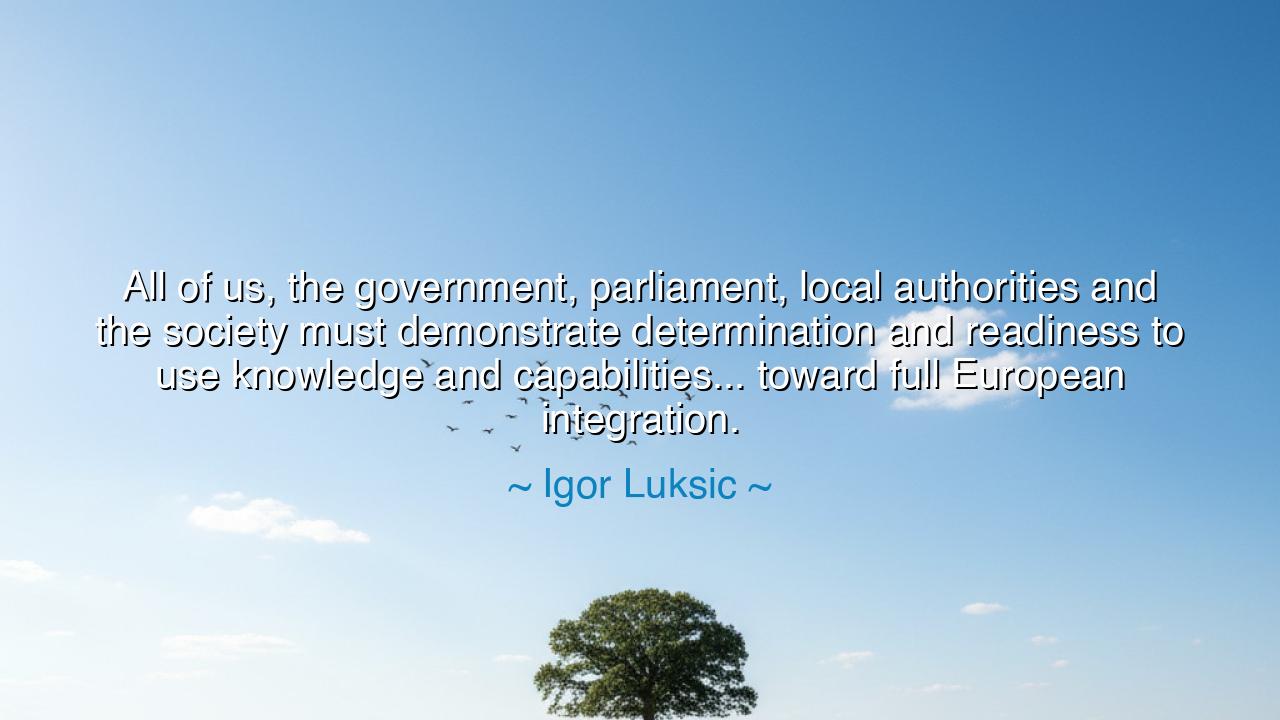
All of us, the government, parliament, local authorities and the
All of us, the government, parliament, local authorities and the society must demonstrate determination and readiness to use knowledge and capabilities... toward full European integration.






The words of Igor Lukšić—“All of us, the government, parliament, local authorities and the society must demonstrate determination and readiness to use knowledge and capabilities… toward full European integration”—speak not only as a political declaration but as a timeless reflection on unity, wisdom, and progress. In these words breathes the spirit of a leader who understands that true integration—whether among nations, communities, or hearts—cannot be built upon power alone, but upon the shared will of an enlightened people. His statement is a call not merely to action, but to awakening, reminding all that the future belongs to those who combine knowledge with determination and vision with cooperation.
In the context of Lukšić’s time, these words were born from Montenegro’s journey toward the European Union, a path that demanded reform, discipline, and national solidarity. Yet, beyond their political origins, his words capture a universal truth about civilization itself: that the progress of a nation is the mirror of its collective character. No government alone can bring transformation, nor can the people thrive without guidance; it is only when the hands of the rulers and the hearts of the citizens move together that true progress is achieved. Thus, Lukšić’s quote stands as a modern echo of the wisdom once spoken by philosophers of the ancient world—that the strength of a state lies not in its armies or wealth, but in its shared purpose and moral education.
To “demonstrate determination and readiness” is to accept that greatness is never given, but earned. It is the spirit that moved the builders of cathedrals, the reformers of nations, and the dreamers of peace. When a people unites in pursuit of something larger than themselves—when government, parliament, and local citizens each perform their part with integrity—they embody the essence of civilization. Lukšić’s emphasis on “knowledge and capabilities” reminds us that progress without wisdom is chaos, and enthusiasm without understanding is folly. Knowledge, therefore, must be the cornerstone of integration—knowledge of law, of history, of one another. For ignorance divides, but understanding unites.
One is reminded of the rebuilding of Europe after the Second World War, when devastation forced the nations of the continent to reconsider what unity meant. It was not simply treaties that rebuilt Europe—it was willpower and wisdom, the courage of those who refused to repeat the mistakes of the past. From that resolve was born the European Union, an alliance not of empires, but of ideals. Lukšić’s words are rooted in this same lineage of hope: the belief that through education, collaboration, and shared purpose, even small nations can rise to stand shoulder to shoulder with the great, not through conquest, but through cooperation.
Yet, the meaning of his message extends far beyond politics. It speaks to every realm of human endeavor—family, community, even the self. To integrate, in any form, is to bridge the gap between difference; to move from isolation toward harmony. Whether between neighbors or nations, integration demands humility, patience, and empathy. It requires that each person contribute their talents not for personal glory, but for collective good. In this, Lukšić’s call becomes a spiritual teaching: that knowledge unshared is barren, and capability unused is wasted potential. When each person places their skill in service of the whole, society itself becomes an organism—alive, growing, and unified.
But such unity cannot exist without determination. Knowledge gives direction, but determination provides strength. History is filled with examples of people who had understanding but lacked will, and thus failed to act. Lukšić’s warning is clear: without readiness, without courage, even the finest vision fades into dream. To move “toward full European integration” is not merely to adopt systems or standards—it is to evolve the very consciousness of a people. It is to learn to think not as isolated citizens, but as members of a greater human family.
The lesson we draw from his words is one of balance: that progress is both an intellectual and moral journey. Knowledge must be sought endlessly, but it must also be guided by compassion; determination must be fierce, but tempered with wisdom. In every age, whether in the building of nations or the bettering of oneself, the same law applies—success belongs to those who combine mind and heart in service of something larger than themselves.
So let us hear Lukšić’s words not as a political plea, but as a universal summons. Whether in a country striving toward unity, a community striving toward harmony, or an individual striving toward self-improvement, the call remains the same: gather your knowledge, awaken your capabilities, and act with unwavering resolve. For only when thought and action walk hand in hand can any people—indeed, any soul—reach its promised horizon.






AAdministratorAdministrator
Welcome, honored guests. Please leave a comment, we will respond soon